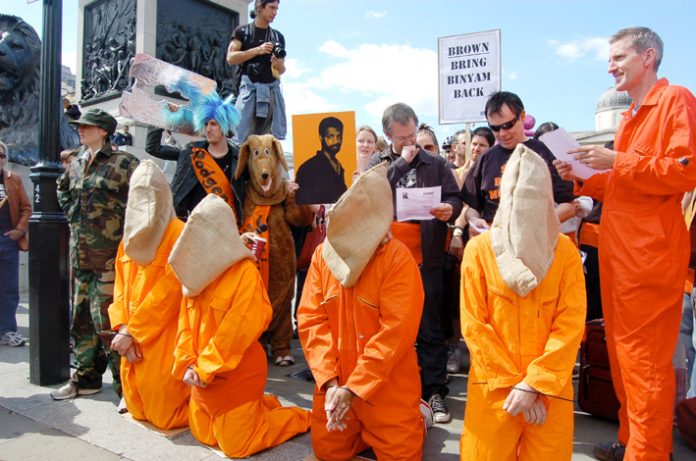
A British court has released some of the confidential material in the case of Binyam Mohamed.
On Monday, the two British judges sitting on the case revealed how the US government tried to get him to sign an agreement stating that he had never been tortured, to promise not to speak with the media upon his release, and to plead guilty as a condition of his release back to Britain – all without his lawyers being allowed access to evidence that would help prove his innocence.
This annex of the British ruling was previously kept confidential by the British court because of the American military commission rules, which forbade making the materials public.
As the British judges make clear, the US military insisted that he sign an agreement never to sue the US, or any US ally (including Britain) for the wrongdoing committed against him – indeed, the military wanted him to assign any rights he might have to compensation to the US government! (Para. 5(iii))
The US military insisted that he accept a minimum sentence of ten years – on top of the seven years of torture he had already suffered. (Para. 5(v))
He was meant to agree to plead guilty notwithstanding the fact that the US military had not told him what the charges were to be. (Para. 6)
Significantly, Binyam Mohamed was required to waive any claim he might have to seeing the exculpatory evidence identified by the British judges, that could help prove his innocence, and how he had been tortured. (Para. 6)
If he was to ask to see this exculpatory evidence, the ‘deal’ would be off. (Para. 10)
He was required to sign a statement saying that he had never been tortured – a statement he insisted was false – and also commit never to speak to the media about his abuse. (Para. 11)
‘The facts revealed today reflect the way the US government has consistently tried to cover up the truth of Binyam Mohamed’s torture,’ said Reprieve Director Clive Stafford Smith, who has represented Binyam for four years.
‘He was being told he would never leave Guantanamo Bay unless he promised never to discuss his torture, and never sue either the Americans or the British to force disclosure of his mistreatment.
‘Gradually the truth is leaking out, and the governments on both sides of the Atlantic should pause to consider whether they should continue to fight to keep this torture evidence secret.’
Binyam Mohamed’s history of torture has been well documented.
During his time in Guantanamo Bay, the US military tried to prosecute him in the military commissions, characterised by the British former Lord Justice Steyn as kangaroo courts.
This proposal discussed by the British courts was made by the US military and came at a time when he was not charged with anything.
It also came after a long history of efforts to make him plead guilty to crimes that he insisted that he did not commit.
He had always been willing to enter a plea of nolo contendere (which essentially means you deny your guilt, but enter a plea as you recognise it is the only way to resolve the case), on the condition that he would be sentenced to time served, and immediately released back to Britain.
‘After the years of suffering he had been through, he was willing to do just about anything to get out of there, but he would not plead guilty to something he did not do, nor would he lie about the fact that he had been tortured,’ said Stafford Smith.
Eventually, by early 2009, the US military was still desperately trying to get him to plead guilty to something – anything – in order to save face.
The final ‘offer’ was that this man, originally alleged to be a most dangerous terrorist, should plead guilty and receive a sentence of only ten days in prison, less than one might expect for many driving offences.
Binyam rejected this offer, as he continued to insist that he was not guilty.
‘Offering a man who is protesting his innocence freedom on the condition that he pleads guilty to something and serves a ten-day sentence is face-saving on an horrific scale,’ said Reprieve Executive Director Clare Algar.
‘Likewise, the “condition” that he agree not to speak about his torture is absolutely shameful.
‘The truth about what happened to Binyam needs to come out and our government should do all it can to make that happen,’ she said.